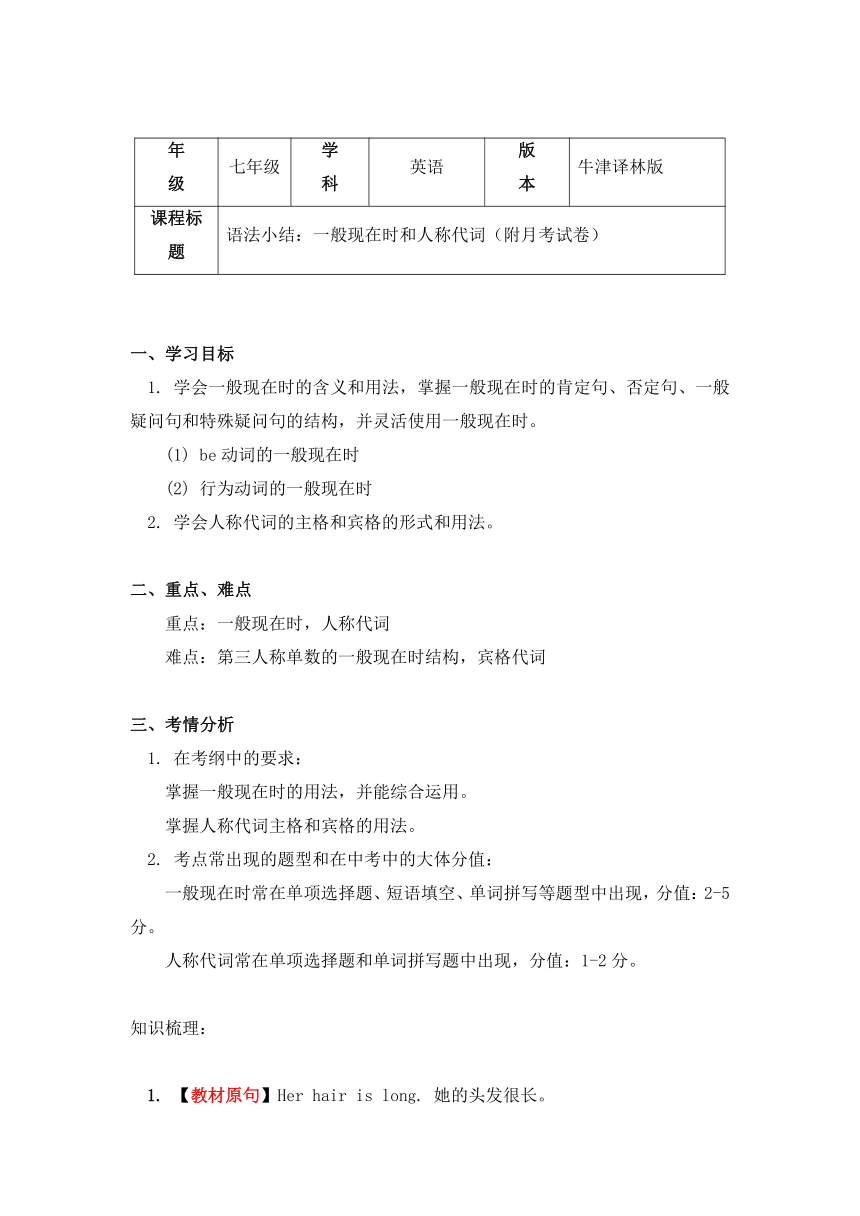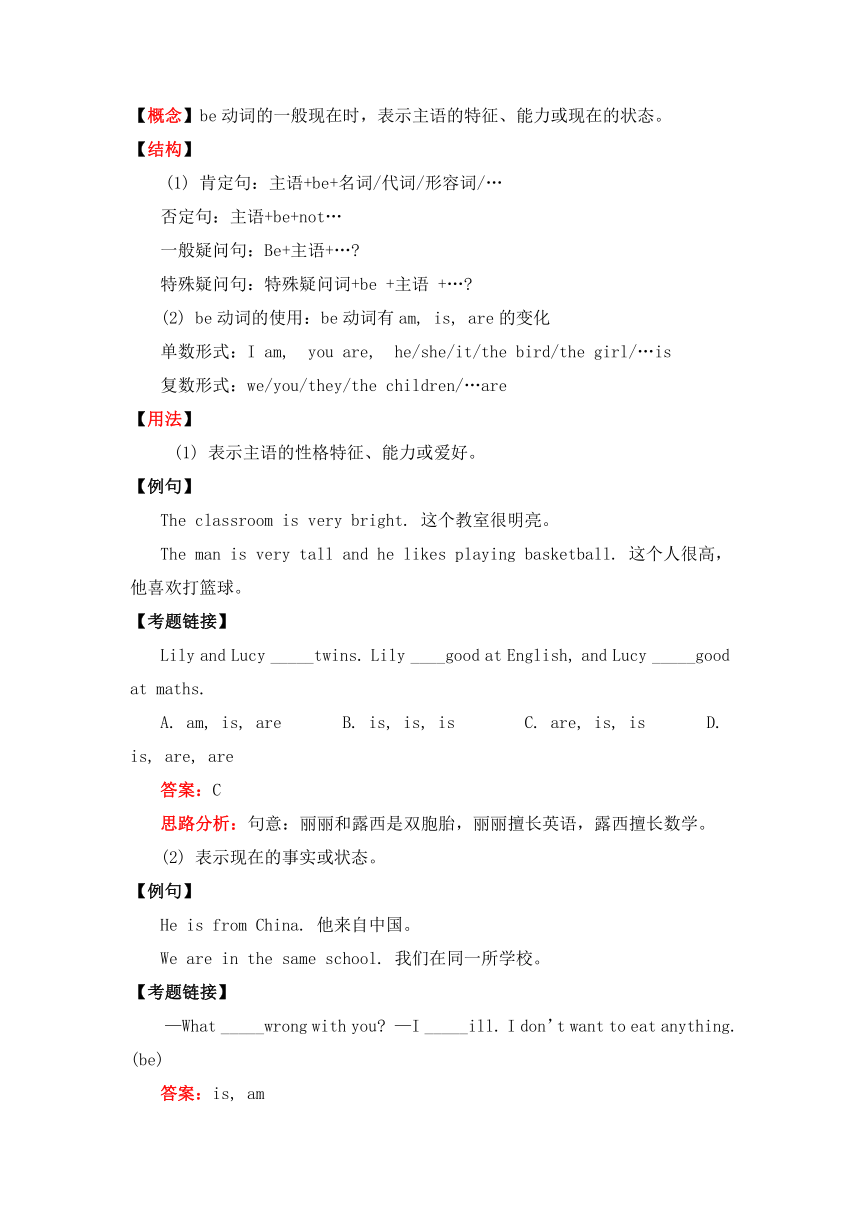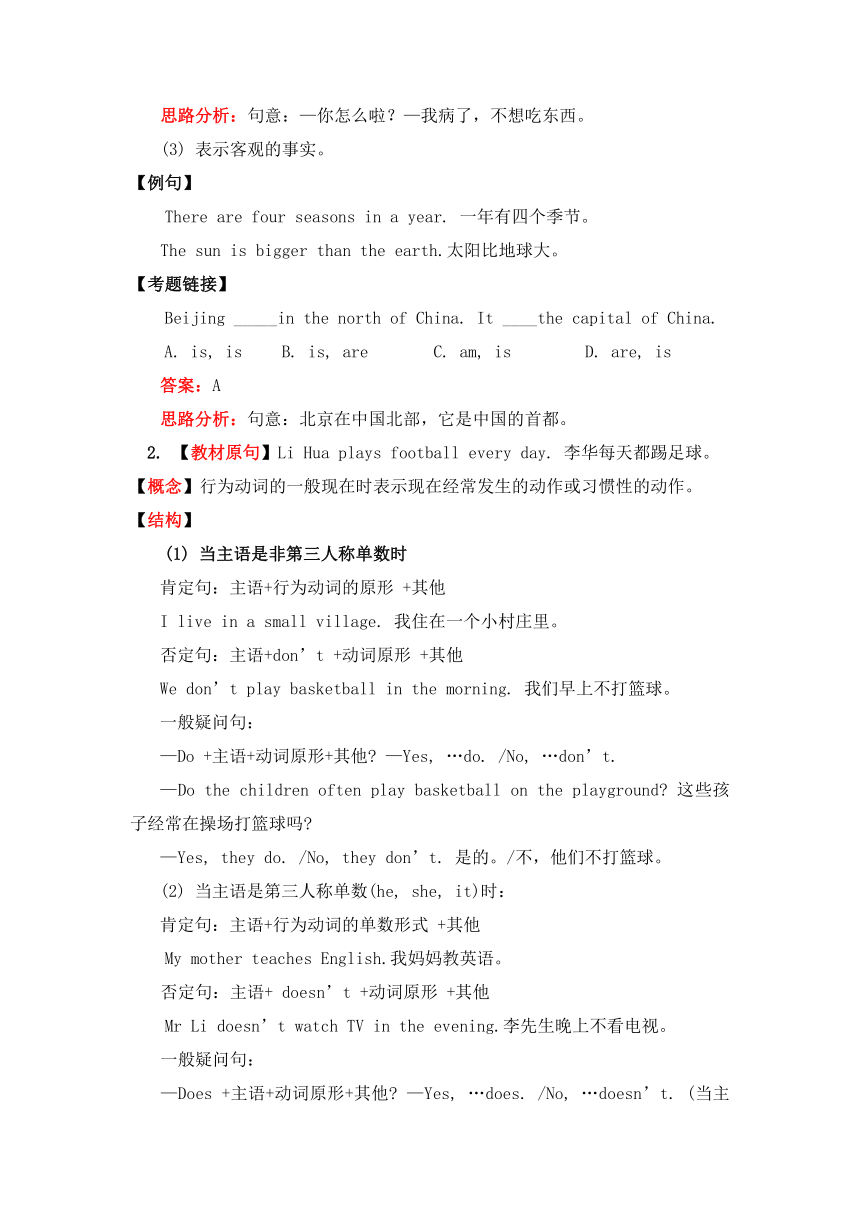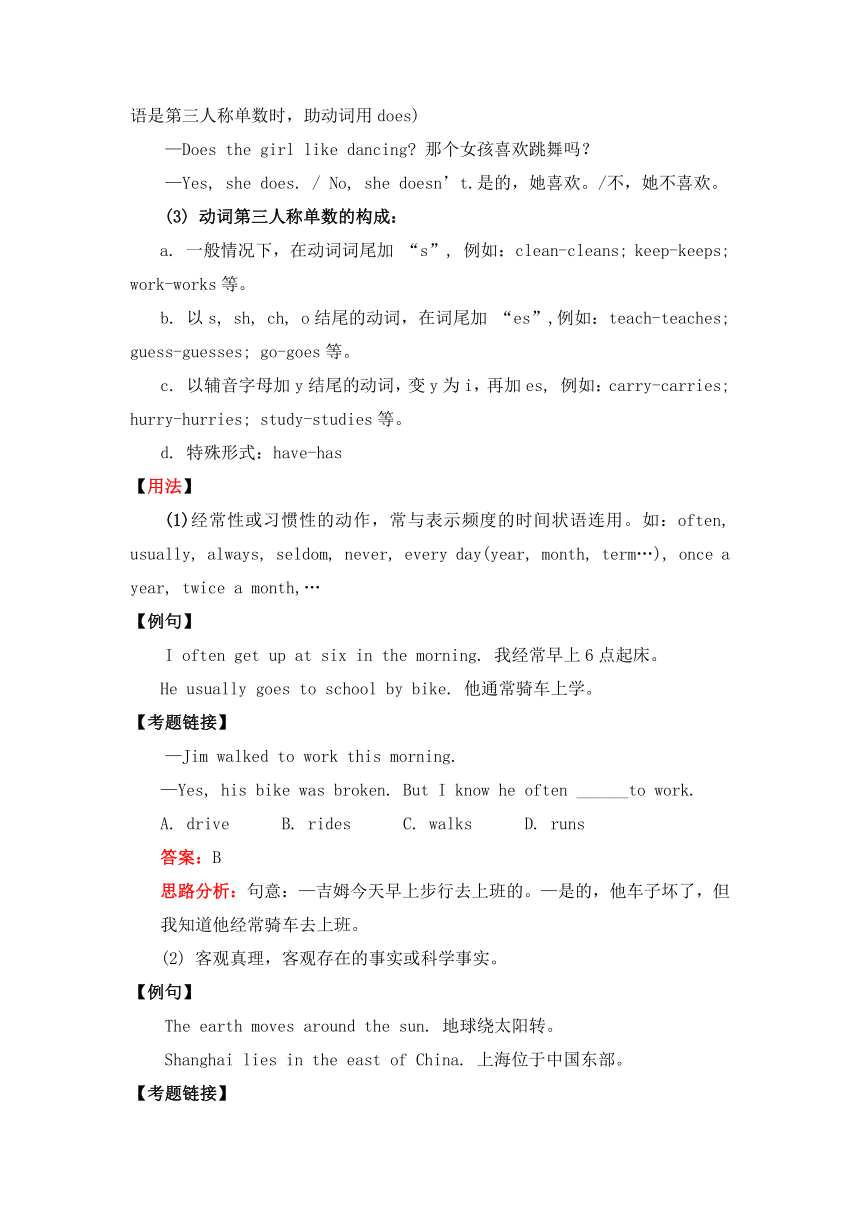牛津译林版英语七年级上册语法小结:一般现在时和人称代词-导学案(含答案)
文档属性
| 名称 | 牛津译林版英语七年级上册语法小结:一般现在时和人称代词-导学案(含答案) |

|
|
| 格式 | doc | ||
| 文件大小 | 64.0KB | ||
| 资源类型 | 教案 | ||
| 版本资源 | 牛津译林版 | ||
| 科目 | 英语 | ||
| 更新时间 | 2020-09-11 00:00:00 | ||
图片预览




文档简介
年 级 七年级 学 科 英语 版 本 牛津译林版
课程标题 语法小结:一般现在时和人称代词(附月考试卷)
一、学习目标
1. 学会一般现在时的含义和用法,掌握一般现在时的肯定句、否定句、一般疑问句和特殊疑问句的结构,并灵活使用一般现在时。
(1) be动词的一般现在时
(2) 行为动词的一般现在时
2. 学会人称代词的主格和宾格的形式和用法。
二、重点、难点
重点:一般现在时,人称代词
难点:第三人称单数的一般现在时结构,宾格代词
三、考情分析
1. 在考纲中的要求:
掌握一般现在时的用法,并能综合运用。
掌握人称代词主格和宾格的用法。
2. 考点常出现的题型和在中考中的大体分值:
一般现在时常在单项选择题、短语填空、单词拼写等题型中出现,分值:2-5分。
人称代词常在单项选择题和单词拼写题中出现,分值:1-2分。
知识梳理:
1. 【教材原句】Her hair is long. 她的头发很长。
【概念】be动词的一般现在时,表示主语的特征、能力或现在的状态。
【结构】
(1) 肯定句:主语+be+名词/代词/形容词/…
否定句:主语+be+not…
一般疑问句:Be+主语+…?
特殊疑问句:特殊疑问词+be +主语 +…?
(2) be动词的使用:be动词有am, is, are的变化
单数形式:I am, you are, he/she/it/the bird/the girl/…is
复数形式:we/you/they/the children/…are
【用法】
(1) 表示主语的性格特征、能力或爱好。
【例句】
The classroom is very bright. 这个教室很明亮。
The man is very tall and he likes playing basketball. 这个人很高,他喜欢打篮球。
【考题链接】
Lily and Lucy _____twins. Lily ____good at English, and Lucy _____good at maths.
A. am, is, are B. is, is, is C. are, is, is D. is, are, are
答案:C
思路分析:句意:丽丽和露西是双胞胎,丽丽擅长英语,露西擅长数学。
(2) 表示现在的事实或状态。
【例句】
He is from China. 他来自中国。
We are in the same school. 我们在同一所学校。
【考题链接】
—What _____wrong with you? —I _____ill. I don’t want to eat anything. (be)
答案:is, am
思路分析:句意:—你怎么啦?—我病了,不想吃东西。
(3) 表示客观的事实。
【例句】
There are four seasons in a year. 一年有四个季节。
The sun is bigger than the earth.太阳比地球大。
【考题链接】
Beijing _____in the north of China. It ____the capital of China.
A. is, is B. is, are C. am, is D. are, is
答案:A
思路分析:句意:北京在中国北部,它是中国的首都。
2. 【教材原句】Li Hua plays football every day. 李华每天都踢足球。
【概念】行为动词的一般现在时表示现在经常发生的动作或习惯性的动作。
【结构】
(1) 当主语是非第三人称单数时
肯定句:主语+行为动词的原形 +其他
I live in a small village. 我住在一个小村庄里。
否定句:主语+don’t +动词原形 +其他
We don’t play basketball in the morning. 我们早上不打篮球。
一般疑问句:
—Do +主语+动词原形+其他? —Yes, …do. /No, …don’t.
—Do the children often play basketball on the playground? 这些孩子经常在操场打篮球吗?
—Yes, they do. /No, they don’t. 是的。/不,他们不打篮球。
(2) 当主语是第三人称单数(he, she, it)时:
肯定句:主语+行为动词的单数形式 +其他
My mother teaches English.我妈妈教英语。
否定句:主语+ doesn’t +动词原形 +其他
Mr Li doesn’t watch TV in the evening.李先生晚上不看电视。
一般疑问句:
—Does +主语+动词原形+其他? —Yes, …does. /No, …doesn’t. (当主语是第三人称单数时,助动词用does)
—Does the girl like dancing? 那个女孩喜欢跳舞吗?
—Yes, she does. / No, she doesn’t.是的,她喜欢。/不,她不喜欢。
(3) 动词第三人称单数的构成:
a. 一般情况下,在动词词尾加 “s”, 例如:clean-cleans; keep-keeps; work-works等。
b. 以s, sh, ch, o结尾的动词,在词尾加 “es”,例如:teach-teaches; guess-guesses; go-goes等。
c. 以辅音字母加y结尾的动词,变y为i,再加es, 例如:carry-carries; hurry-hurries; study-studies等。
d. 特殊形式:have-has
【用法】
(1)经常性或习惯性的动作,常与表示频度的时间状语连用。如:often, usually, always, seldom, never, every day(year, month, term…), once a year, twice a month,…
【例句】
I often get up at six in the morning. 我经常早上6点起床。
He usually goes to school by bike. 他通常骑车上学。
【考题链接】
—Jim walked to work this morning.
—Yes, his bike was broken. But I know he often ______to work.
A. drive B. rides C. walks D. runs
答案:B
思路分析:句意:—吉姆今天早上步行去上班的。—是的,他车子坏了,但我知道他经常骑车去上班。
(2) 客观真理,客观存在的事实或科学事实。
【例句】
The earth moves around the sun. 地球绕太阳转。
Shanghai lies in the east of China. 上海位于中国东部。
【考题链接】
Our teacher told us that light ____faster than sound.
A. travel B. travels C. travelled D. traveling
答案:B
思路分析:句意:老师告诉我们光比声传播得快。
(3) 表示格言或警句
【例句】
Practice makes perfect. 熟能生巧。
Pride goes before a fall. 骄者必败。
【考题链接】
—Why do you get here so early?
—Don’t you know the early bird _____the worm?
A. catch B. catches C. caught D. catching
答案:B
思路分析:句意:—你们为什么到这么早?—难道你不知道早起的鸟有虫吃?
(4) 用来表示在时间上已确定或安排好的事情,可用于表示将来的含义。常用的动词有come, go, arrive, leave, start, begin, return, live, fly等。
【例句】
The train leaves at six tomorrow morning. 火车明天早上6点离开。
—When does the bus start? 汽车什么时候发车?
—It starts in ten minutes. 十分钟以后。
【考题链接】
—What time can we get to the hall tomorrow?
—The meeting _____ (begin) at eight. You can get there before eight.
答案:begins
思路分析:句意:—我们明天几点到达礼堂呢?—会议八点开始,你们可以八点前到那。
(5) 在时间状语从句或条件状语从句中, 常用一般现在时代替将来时。
【例句】
I will tell him about it when he comes home. 他回到家的时候我会把这件事告诉他。
If he is free, I will go to the park with him. 如果他有空,我就跟他一起去公园。
【考题链接】
If it _____tomorrow, we will go to the West Hill.
A. doesn’t rain B. don’t rain C. rain D. will not rain
答案:A
思路分析:句意:如果明天不下雨,我们就去西山。
3. 【教材原句】I have some new friends. I like to play with them after class. 我有一些新朋友,我课后喜欢跟他们一起玩。
【概念】用来代替人或物的词称为人称代词,其有主格和宾格之分。
【用法】
1)主格代词:用来作主语,表示某人或某物怎么样或做什么。主格代词有:I, you, he, she, it, we, you, they
单 数 复 数
人称 一 二 三 一 二 三
代词 I you he she it we you they
【例句】
I have a lovely cat. It likes eating fish very much. 我有一只可爱的小猫,它非常喜欢吃鱼。
Jim and I are classmates. We often talk to each other after class.我和吉姆是同学,我们课后经常互相聊天。
【考题链接】
(1) —Where did you go for your winter vacation?
—My family went to Paris. ________ had a great time.
A. He B. She C. We D. They
(2) Xiaoming and his brother are in the same school. And _________ like sports very much.
A. they B. them C. their D. themselves
答案:(1)C (2)A
思路分析:(1)句意:—你在哪过的寒假?—我一家人去的巴黎,我们在那儿玩得很开心。
2)宾格代词:放在动词或介词之后的代词为宾格代词。宾格代词有:me, you, him, her, it, us, you, them。
单 数 复 数
人称 一 二 三 一 二 三
代词 me you him her it us you them
【例句】
Let her tell you something about it. 让她告诉你关于这件事的情况。
He often helps me with my English. 他经常帮助我学习英语。
【考题链接】
(1) Tell Sally to call____, please. (山东临沂)
A. my B. me C. mine D. myself
(2) Your parents are talking to you, Jack. Please listen to ______carefully. (北京)
A. they B. their C. them D. theirs
答案:(1) B (2) C
思路分析:句意:(1)请告诉萨利给我打电话。(2) 你的父母正在跟你说话,杰克,仔细听他们讲。
即学即练:
填空:
1. ________they __________(get) up at six every day?
2. She ______________(not watch) TV after supper. She __________(do) her homework.
3. What ________ the man often ___________(have) for lunch?
4. Excuse _________, can you help ________ clean the desk? ________ am too busy. (我)
5. Where is Lily? I can’t find ___________. _______ mother is looking for ________. (她)
6. __________(他) has many friends. ___________(他们) often help ________(他).
7. Thank __________(你) for telling ___________(我们) the time.
答案:1. Do, get 2. doesn’t watch, does 3. does, have 4. me, me, I 5. her, Her, her 6. He, They, him 7. you, us
课程标题 语法小结:一般现在时和人称代词(附月考试卷)
一、学习目标
1. 学会一般现在时的含义和用法,掌握一般现在时的肯定句、否定句、一般疑问句和特殊疑问句的结构,并灵活使用一般现在时。
(1) be动词的一般现在时
(2) 行为动词的一般现在时
2. 学会人称代词的主格和宾格的形式和用法。
二、重点、难点
重点:一般现在时,人称代词
难点:第三人称单数的一般现在时结构,宾格代词
三、考情分析
1. 在考纲中的要求:
掌握一般现在时的用法,并能综合运用。
掌握人称代词主格和宾格的用法。
2. 考点常出现的题型和在中考中的大体分值:
一般现在时常在单项选择题、短语填空、单词拼写等题型中出现,分值:2-5分。
人称代词常在单项选择题和单词拼写题中出现,分值:1-2分。
知识梳理:
1. 【教材原句】Her hair is long. 她的头发很长。
【概念】be动词的一般现在时,表示主语的特征、能力或现在的状态。
【结构】
(1) 肯定句:主语+be+名词/代词/形容词/…
否定句:主语+be+not…
一般疑问句:Be+主语+…?
特殊疑问句:特殊疑问词+be +主语 +…?
(2) be动词的使用:be动词有am, is, are的变化
单数形式:I am, you are, he/she/it/the bird/the girl/…is
复数形式:we/you/they/the children/…are
【用法】
(1) 表示主语的性格特征、能力或爱好。
【例句】
The classroom is very bright. 这个教室很明亮。
The man is very tall and he likes playing basketball. 这个人很高,他喜欢打篮球。
【考题链接】
Lily and Lucy _____twins. Lily ____good at English, and Lucy _____good at maths.
A. am, is, are B. is, is, is C. are, is, is D. is, are, are
答案:C
思路分析:句意:丽丽和露西是双胞胎,丽丽擅长英语,露西擅长数学。
(2) 表示现在的事实或状态。
【例句】
He is from China. 他来自中国。
We are in the same school. 我们在同一所学校。
【考题链接】
—What _____wrong with you? —I _____ill. I don’t want to eat anything. (be)
答案:is, am
思路分析:句意:—你怎么啦?—我病了,不想吃东西。
(3) 表示客观的事实。
【例句】
There are four seasons in a year. 一年有四个季节。
The sun is bigger than the earth.太阳比地球大。
【考题链接】
Beijing _____in the north of China. It ____the capital of China.
A. is, is B. is, are C. am, is D. are, is
答案:A
思路分析:句意:北京在中国北部,它是中国的首都。
2. 【教材原句】Li Hua plays football every day. 李华每天都踢足球。
【概念】行为动词的一般现在时表示现在经常发生的动作或习惯性的动作。
【结构】
(1) 当主语是非第三人称单数时
肯定句:主语+行为动词的原形 +其他
I live in a small village. 我住在一个小村庄里。
否定句:主语+don’t +动词原形 +其他
We don’t play basketball in the morning. 我们早上不打篮球。
一般疑问句:
—Do +主语+动词原形+其他? —Yes, …do. /No, …don’t.
—Do the children often play basketball on the playground? 这些孩子经常在操场打篮球吗?
—Yes, they do. /No, they don’t. 是的。/不,他们不打篮球。
(2) 当主语是第三人称单数(he, she, it)时:
肯定句:主语+行为动词的单数形式 +其他
My mother teaches English.我妈妈教英语。
否定句:主语+ doesn’t +动词原形 +其他
Mr Li doesn’t watch TV in the evening.李先生晚上不看电视。
一般疑问句:
—Does +主语+动词原形+其他? —Yes, …does. /No, …doesn’t. (当主语是第三人称单数时,助动词用does)
—Does the girl like dancing? 那个女孩喜欢跳舞吗?
—Yes, she does. / No, she doesn’t.是的,她喜欢。/不,她不喜欢。
(3) 动词第三人称单数的构成:
a. 一般情况下,在动词词尾加 “s”, 例如:clean-cleans; keep-keeps; work-works等。
b. 以s, sh, ch, o结尾的动词,在词尾加 “es”,例如:teach-teaches; guess-guesses; go-goes等。
c. 以辅音字母加y结尾的动词,变y为i,再加es, 例如:carry-carries; hurry-hurries; study-studies等。
d. 特殊形式:have-has
【用法】
(1)经常性或习惯性的动作,常与表示频度的时间状语连用。如:often, usually, always, seldom, never, every day(year, month, term…), once a year, twice a month,…
【例句】
I often get up at six in the morning. 我经常早上6点起床。
He usually goes to school by bike. 他通常骑车上学。
【考题链接】
—Jim walked to work this morning.
—Yes, his bike was broken. But I know he often ______to work.
A. drive B. rides C. walks D. runs
答案:B
思路分析:句意:—吉姆今天早上步行去上班的。—是的,他车子坏了,但我知道他经常骑车去上班。
(2) 客观真理,客观存在的事实或科学事实。
【例句】
The earth moves around the sun. 地球绕太阳转。
Shanghai lies in the east of China. 上海位于中国东部。
【考题链接】
Our teacher told us that light ____faster than sound.
A. travel B. travels C. travelled D. traveling
答案:B
思路分析:句意:老师告诉我们光比声传播得快。
(3) 表示格言或警句
【例句】
Practice makes perfect. 熟能生巧。
Pride goes before a fall. 骄者必败。
【考题链接】
—Why do you get here so early?
—Don’t you know the early bird _____the worm?
A. catch B. catches C. caught D. catching
答案:B
思路分析:句意:—你们为什么到这么早?—难道你不知道早起的鸟有虫吃?
(4) 用来表示在时间上已确定或安排好的事情,可用于表示将来的含义。常用的动词有come, go, arrive, leave, start, begin, return, live, fly等。
【例句】
The train leaves at six tomorrow morning. 火车明天早上6点离开。
—When does the bus start? 汽车什么时候发车?
—It starts in ten minutes. 十分钟以后。
【考题链接】
—What time can we get to the hall tomorrow?
—The meeting _____ (begin) at eight. You can get there before eight.
答案:begins
思路分析:句意:—我们明天几点到达礼堂呢?—会议八点开始,你们可以八点前到那。
(5) 在时间状语从句或条件状语从句中, 常用一般现在时代替将来时。
【例句】
I will tell him about it when he comes home. 他回到家的时候我会把这件事告诉他。
If he is free, I will go to the park with him. 如果他有空,我就跟他一起去公园。
【考题链接】
If it _____tomorrow, we will go to the West Hill.
A. doesn’t rain B. don’t rain C. rain D. will not rain
答案:A
思路分析:句意:如果明天不下雨,我们就去西山。
3. 【教材原句】I have some new friends. I like to play with them after class. 我有一些新朋友,我课后喜欢跟他们一起玩。
【概念】用来代替人或物的词称为人称代词,其有主格和宾格之分。
【用法】
1)主格代词:用来作主语,表示某人或某物怎么样或做什么。主格代词有:I, you, he, she, it, we, you, they
单 数 复 数
人称 一 二 三 一 二 三
代词 I you he she it we you they
【例句】
I have a lovely cat. It likes eating fish very much. 我有一只可爱的小猫,它非常喜欢吃鱼。
Jim and I are classmates. We often talk to each other after class.我和吉姆是同学,我们课后经常互相聊天。
【考题链接】
(1) —Where did you go for your winter vacation?
—My family went to Paris. ________ had a great time.
A. He B. She C. We D. They
(2) Xiaoming and his brother are in the same school. And _________ like sports very much.
A. they B. them C. their D. themselves
答案:(1)C (2)A
思路分析:(1)句意:—你在哪过的寒假?—我一家人去的巴黎,我们在那儿玩得很开心。
2)宾格代词:放在动词或介词之后的代词为宾格代词。宾格代词有:me, you, him, her, it, us, you, them。
单 数 复 数
人称 一 二 三 一 二 三
代词 me you him her it us you them
【例句】
Let her tell you something about it. 让她告诉你关于这件事的情况。
He often helps me with my English. 他经常帮助我学习英语。
【考题链接】
(1) Tell Sally to call____, please. (山东临沂)
A. my B. me C. mine D. myself
(2) Your parents are talking to you, Jack. Please listen to ______carefully. (北京)
A. they B. their C. them D. theirs
答案:(1) B (2) C
思路分析:句意:(1)请告诉萨利给我打电话。(2) 你的父母正在跟你说话,杰克,仔细听他们讲。
即学即练:
填空:
1. ________they __________(get) up at six every day?
2. She ______________(not watch) TV after supper. She __________(do) her homework.
3. What ________ the man often ___________(have) for lunch?
4. Excuse _________, can you help ________ clean the desk? ________ am too busy. (我)
5. Where is Lily? I can’t find ___________. _______ mother is looking for ________. (她)
6. __________(他) has many friends. ___________(他们) often help ________(他).
7. Thank __________(你) for telling ___________(我们) the time.
答案:1. Do, get 2. doesn’t watch, does 3. does, have 4. me, me, I 5. her, Her, her 6. He, They, him 7. you, us
同课章节目录
- 预备课程
- Lesson 1 Nice to meet you !
- Lesson 2 A happy family
- Lesson 3 A nice school
- Lesson 4 You look cool !
- Lesson 5 Wonderful things
- Lesson 6 Have nice food
- Lesson 7 Enjoy our days
- Lesson 8 Let's have fun !
- Unit 1 This is me
- Unit 2 Let's play sports
- Unit 3 Welcome to our school
- Unit 4 My day
- Unit 5 Let’s celebrate
- Unit 6 Food and lifestyle
- Unit 7 Shopping
- Unit 8 Fashion
